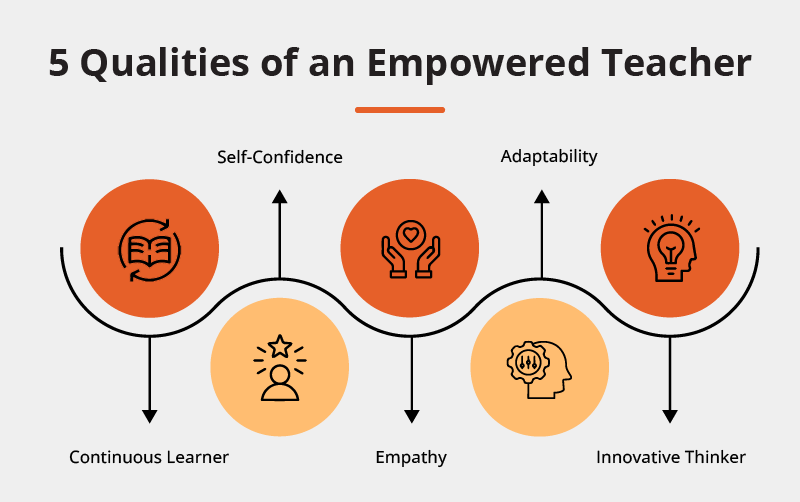The Power of Growth: The Crucial Role of Self-Development For Teachers’ Success

Imagine a world where all teachers had the opportunity and required skills to pursue their area of excellence, build expertise and thrive in their careers. It would not only enable them to shape young minds successfully but also unlock innovative and self-assured ways to create a positive learning environment. However, as a result of the complexities of modern classrooms, the path to becoming an empowered educator is paved with varied challenges. Overcoming these challenges requires indispensable self-confidence and continuous development which is the cornerstone of empowerment.
For instance, tracking student progress by evaluating their performance is a great way for educators to ensure that their teaching strategies are working. It instills a sense of confidence and assurance in their own abilities. To get an in-depth insight on the benefits of assessments for teachers, read our blog on how midterm assessments empower educators and head back here to follow up!
So, as an educator, what does self-confidence truly mean? And how can it be integrated into the roles and responsibilities of a teacher? Join us as we delve into the profound significance of self-confidence in a teacher’s career development and the key strategies to becoming an empowered educator.
5 Qualities of an Empowered Educator

When we talk about true empowerment, it is an aspect of a teacher’s career that goes beyond just their instructional time with students. Today, the role of a teacher has grown beyond the confines of traditional pedagogy. By refining their skills and developing unwavering confidence in their abilities, teachers can adapt to the evolving educational landscape and innovate within their classrooms. It fuels their motivation to engage students by embracing innovative teaching methods and fostering a positive learning environment.
It is the combination of self-confidence and continuous growth that empowers teachers to make a lasting impact on students and become a role-model for fellow educators. If you’re a teacher who’s charting the path to career development, here are the top 5 key qualities that define an empowered teacher:
1. Self-Confidence
An empowered educator exudes a strong sense of self-assurance. They are determined, focused and believe in their abilities. This unwavering trust enables them to take more risks when it comes to trying out new pedagogical approaches in the classroom, adapt to changing circumstances and venture beyond their comfort zones.
2. Adaptability
An adaptable nature empowers educators to pivot when faced with unexpected challenges and reset their strategies based on the diverse needs of students. They embrace change as an opportunity for growth and are always prepared with dynamic approaches to ensure optimal learning outcomes.
3. Continuous Learner
Empowered teachers recognize that learning is a lifelong process. They are committed to their personal and professional development and constantly seek ways to be better. Such teachers stay on top of the latest educational trends, new technologies and teaching methods. By demonstrating their dedication to learn, they set a powerful example for their students, instilling the importance of being a continuous learner.
4. Empathy
A deep understanding of students’ needs, emotions, challenges and learning style and addressing them with compassion is what creates a nurturing learning environment. Empowered teachers understand the importance of empathy and know how to effectively create a supportive classroom environment where every student feels valued and heard.
5. Innovative Thinkers
Empowered teachers are strongly connected to their craft and are passionate about what they do. This strong passion for teaching enables them to become innovative thinkers who are unafraid to experiment with new technologies or teaching methods to engage their students and maintain an inspiring classroom dynamic.
Key Transformative Self-Development Strategies to Help Teachers Build Confidence
Self-development is a key aspect that guides educators on their journey towards becoming exemplary role models in education. Through honing their skills and being continuous learners, teachers can not only attain professional heights but also inspire their colleagues to elevate their potential.
If you’re looking to enhance your role as a teacher, boosting your confidence levels and working on solidifying your overall skills as a professional is the first and most crucial step to conquer. Here are five key self-development strategies tailored for teachers to excel in their roles while inspiring students and fellow educators:
1. Professional Development
It is important to expand your knowledge base and improve your teaching practices based on the latest updates in the world of education. Enroll for professional degree or certificate programs, attend workshops, educational seminars or online courses to hone your existing skills and develop new ones. Moreover, for teachers in today’s digital age, strengthening your tech skills is absolutely crucial and a key aspect for boosting career growth.
2. Reflective Practices
Inculcate the habit of effectively analyzing aspects like your teaching methods, classroom dynamics, student interactions, etc. and engaging in self-reflection. Make a note of things you would like to improve and what you could do differently the next time. It is important to reflect on your strengths as well as areas of improvement. This will not only make you more self-aware but also improve your skills and build confidence in the long-run.
3. Supportive Network
Developing a network of supportive colleagues can be invaluable to self-development for teachers. Engaging in professional communities, participating in teacher collaborations, and seeking guidance from experienced educators fosters an environment of growth, encouragement, and shared learning.
4. Set Clear & Achievable Goals
It is important to establish clear and measurable goals to achieve professional development as a teacher. These goals could be related to learning outcomes, classroom management, teaching pedagogy or career advancement. Conquering these milestones successfully will boost your confidence and sense of accomplishment.
5. Work-Life Balance
A key aspect of professional success has to do with prioritizing work-life equilibrium. Practices like mindfulness meditations and regular exercise can help you manage stress and avoid burnouts. Moreover, setting boundaries at work can make you more emotionally balanced as a teacher to provide quality education and serve as a role model to students.
Elevating your potential as a teacher through building self-confidence and undertaking self-development practices is not a linear path and only comes with focus, determination and regular practice. It is important to always be one step ahead of your competition in order to make your mark in this dynamic industry.
You can kick start this journey of leveling up your teaching career by exploring the Extramarks Teaching App that provides educators with a powerful platform featuring modern edtech tools to enhance their overall teaching experience. Learning how to leverage these tools can be a great plus for your teaching portfolio and gives you the opportunity to build expertise in the latest digital learning tools.
By incorporating self-development strategies into the professional journey, educators enhance the effectiveness of their teaching practices and become catalysts for positive change both in the classroom and beyond. Investing in self-development practices ultimately leads to a more fulfilling and successful teaching career.
Last Updated on April 16, 2025
Reviewed by

Prachi Singh | VP - Academics
Prachi Singh is a highly accomplished educationist with over 16 years of experience in the EdTech industry. Currently, she plays a pivotal role at Extramarks, leading content strategy and curriculum development initiatives that shape the future of education...read more.










